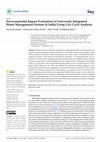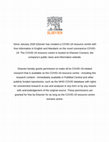Papers by Dr. Amit Kumar Jaglan
IOCBD 2023
This article is an open access article distributed under the terms and conditions of the Creative... more This article is an open access article distributed under the terms and conditions of the Creative Commons Attribution (CC BY
IOCBD 2023
This article is an open access article distributed under the terms and conditions of the Creative... more This article is an open access article distributed under the terms and conditions of the Creative Commons Attribution (CC BY

Sustainability
Decarbonization of university campuses by integrating scientific waste approaches and circular ec... more Decarbonization of university campuses by integrating scientific waste approaches and circular economy principles is the need-of-the-hour. Universities, the maximum energetic corporations and places for clinical studies and social activities, have a duty to assemble low-carbon campuses and play a vital function in lowering CO2 emissions. An environmental life cycle assessment was conducted to compare proposed municipal solid waste (MSW) treatment systems with the existing system in the residential university campus (RUC) in Kharagpur, West Bengal (India). The results show the existing MSW disposal practice in RUC (baseline scenario has the highest GWP (1388 kg CO2 eq), which can potentially be reduced by adopting integrated waste management system with source segregation as represented in futuristic scenarios (S2—50% sorting) and (S3—90% sorting)). Compared to S1, GHG emission was reduced by 50.9% in S2 and by 86.5% in S3. Adopting anaerobic digestion and engineered landfill without...

Resources, Conservation and Recycling, 2020
The crisis brought upon by the COVID-19 pandemic has altered global waste generation dynamics and... more The crisis brought upon by the COVID-19 pandemic has altered global waste generation dynamics and therefore has necessitated special attention. The unexpected fluctuations in waste composition and quantity also require a dynamic response from policymakers. This study highlights the challenges faced by the solid waste management sector during the pandemic and the underlying opportunities to fill existing loopholes in the system. The study presents specific cases for biomedical waste, plastic waste, and food waste management-all of which have been a major cause of concern during this crisis. Further, without active citizen participation and cooperation, commingled virus-laden biomedical waste with the regular solid waste stream pose significant negative health and safety issues to sanitation workers. Single-use plastic usage is set to bounce back due to growing concerns of hygiene, particularly from products used for personal protection and healthcare purposes. It is expected that household food waste generation may reduce due to increased conscious buying of more non-perishable items during lockdown and due to concerns of food shortage. However, there is a chance of increase in food waste from the broken supply chains such as food items getting stuck on road due to restriction in vehicle movements, lack of workers in the warehouse for handling the food products, etc. The study also stresses the need for building localized resilient supply chains to counter such situations during future pandemics. While offering innovative solutions to existing waste management challenges, the study also suggests some key recommendations to the policymakers to help handle probable future pandemics if any holistically.
This chapter presents an overview of the food industry with an emphasis on ice-cream raw material... more This chapter presents an overview of the food industry with an emphasis on ice-cream raw materials, the processes and methods followed, and their effect on the environment and human health. Raw material extraction contributes a major impact in all the categories of life cycle analysis, whereas the manufacturing process leads to fossil fuel depletion. Furthermore, the cultivation of crops may contribute to global warming due to land-use change. The production unit and refrigeration consume high energy, which accounts for the depletion of the ozone layer. Finally, further development and improvement are required to combat the problems associated with ice-cream production.











Uploads
Papers by Dr. Amit Kumar Jaglan